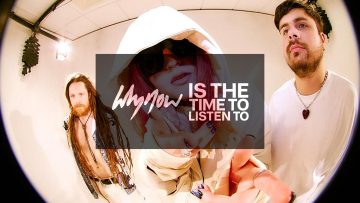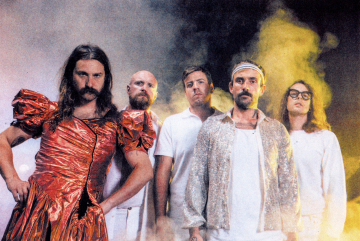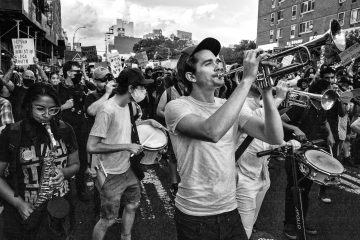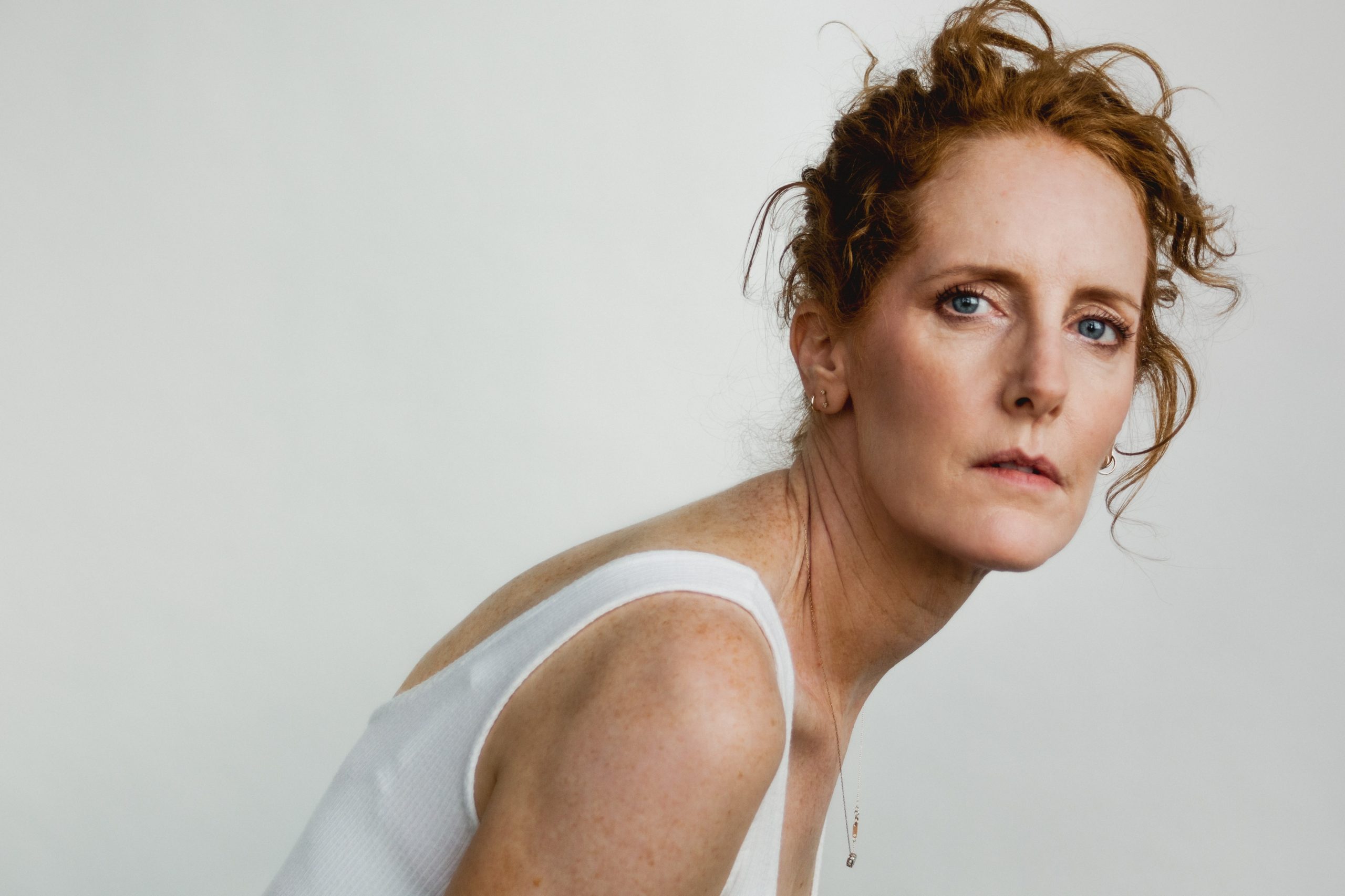
Reality Winner was just 25 years old when the FBI showed up at her door, questioning her in relation to leaking classified NSA documents. Ultimately, she faced one of the toughest sentences ever given for releasing government documents to the press.
After adapting the transcript into a play in 2019, director Tina Satter now makes her cinematic debut with Reality, a taut, striking thriller which chronicles Reality’s arrest, with dialogue lifted directly from the official FBI transcript. Satter tells us all about how the film came to be.
What sparked the idea that you wanted to tell this story first on-stage?
The transcript to me was like this quivering document. Even the first page of the transcript said ‘verbatim transcription’, and then listed participants as if they were characters in a play. It listed Reality, the two agents, and then it listed a fourth participant, an unknown male, and the unknown male just felt like a really loaded thing.
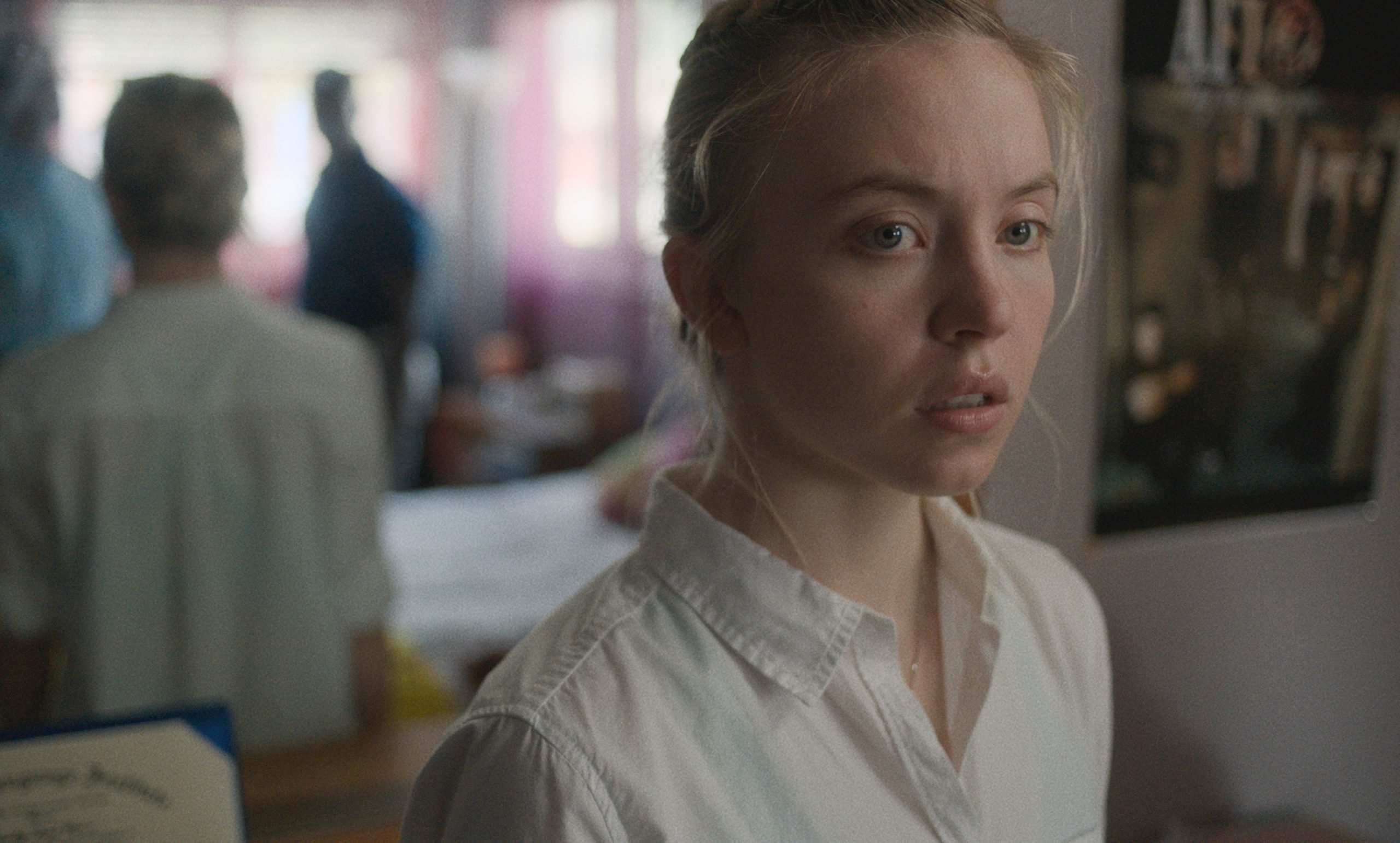
Credit: Vertigo Releasing
As soon as I was reading that first page, I could just feel this tension in that document, because it captured all the umms and the pauses and the stutters. And as I kept reading, I was like, ‘Oh, my God, Reality is just going head to head with these guys.’ I thought it could be the basis of a play and it felt like a thriller movie to me.
How do you build that tension in a cinematic way?
The first time I read that, I read it knowing this person was in prison six months later. The conversation was such an unexpected, intense version of an interrogation. We’ve seen so many versions of those on TV and, and films, and I think often quite accurately, but the fact that she’s just at home and in jean shorts, and suddenly these dudes are there… She has so much in common with them in a certain way; she’s ex-military, she can talk security lingo… I was so curious as to how she was going to finally admit it, because obviously I knew at some point she’s going to have to. They kept talking to her for so long afterwards too, she said such incredible stuff then because they asked her more of the why.
The last third of it was really compelling to me, after she’s admitted it because you’re then dealing with a young human being who literally is understanding that her life is changing by the second. She doesn’t yet know how bad it’s gonna get. So in this really intense way, you’re with this human being in real time.
Because the dialogue comes from the official transcript, what does that do to the performances? The coughing by Josh Hamilton’s character was driving me mad!
The coughs are in the transcript! This is something that we talked about a lot, especially with the role of Garrick which Josh Hamilton plays. It’s probably a crafted performance that that man was doing in real life that day.
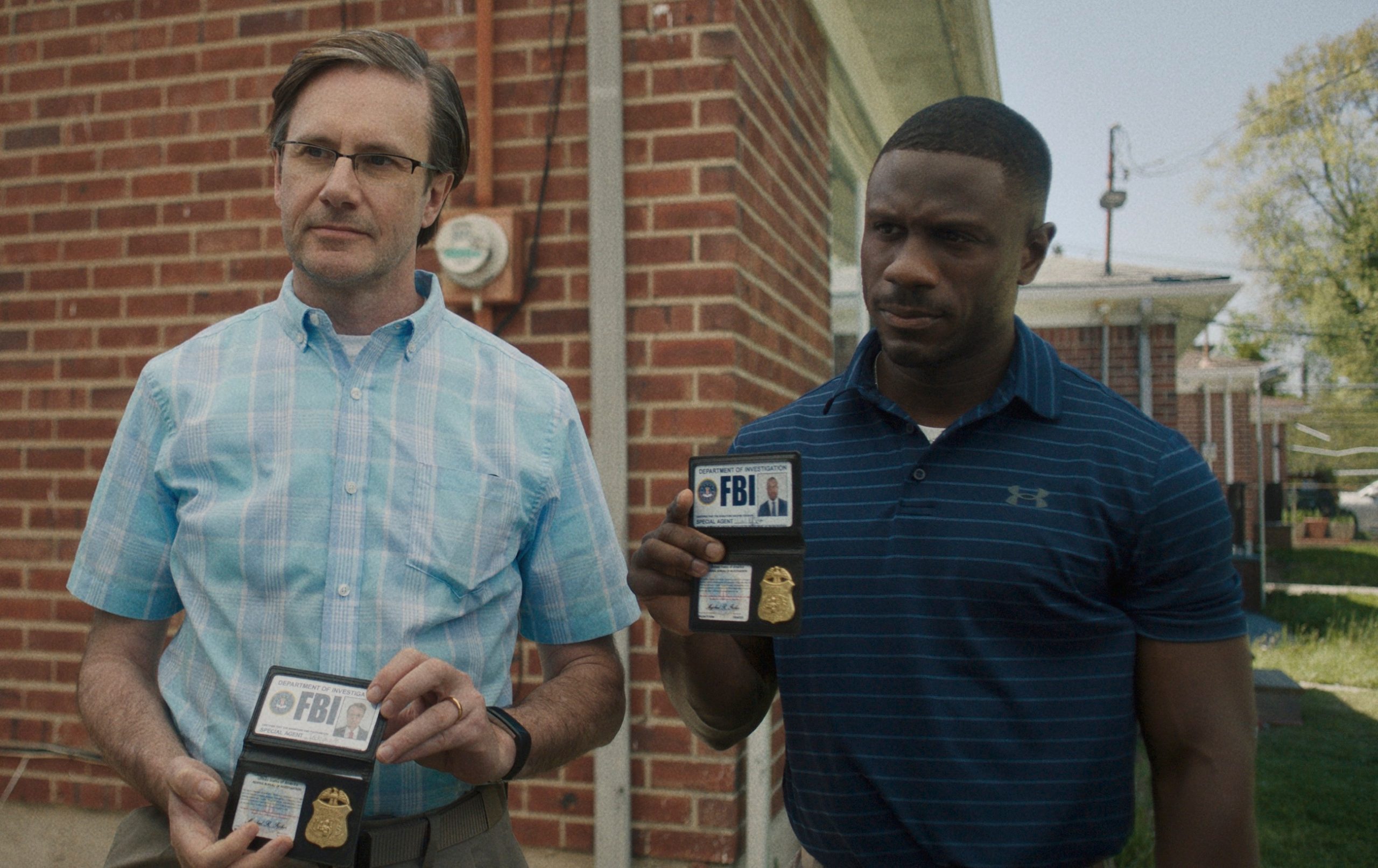
Credit: Vertigo Releasing
Josh noticed this when we really talked about it; he stutters a lot in the first part, just a guy talking and finding his words, making awkward, friendly conversation. Josh noticed in the last third, he’s not really stuttering anymore. Once they get what they need, he’s pretty direct in his questions. It was a great layer that all the actors talked about working into their performance, while also keeping it as natural as possible.
How did you work on that naturalism? Through rehearsals?
We did do some table work, which in theatre is common. You sit at a table and talk through the script. So much of [the transcript] is repetitive, the agents keep returning to certain things.
Especially for Reality, and for Sydney, what is the trajectory through these various sections? Otherwise, on camera, it was about letting Sydney stay in the zone and not trying to make it too crafted from my end once we were shooting. Sydney could do these amazing, nuanced adjustments, so we had all those emotional options.
It feels like gender plays a huge part in it? The way you frame Sydney among all these men…
To me, that was what was so striking. Reality Winner is really buff. She’s a little bit taller and bigger than Sydney, but she’s not a super tall person. [She was] a young woman, who was home alone, and 11 men with concealed weapons walk in.

Credit: Vertigo Releasing
To me, that gender thing was super fascinating and very clear. There was no woman there until she had to be patted down at the end. I think especially as women, we really understand what that could feel like.
You go into it towards the end, when you show the news reports about Reality’s arrest. Do you think it would have been different if it was a man?
She was given such an intense sentence. This is me totally just speculating, because there’s so many things at play, but to me, it’s maybe more about power than gender. And of course, gender is implicit in who’s getting into positions of power.
The summer of 2017, when she’s arrested and then held without bail, there are other major political, adjacent figures in the United States who get arrested, but are allowed to be home, in mansions with pools, and they’re going to be charged with something bigger than Reality, all related to the politics of the time.
And Reality is out of prison but not completely free yet?
Yeah, she’s not totally free. She’s on what’s called supervised release, and she’s moved through these phases of her probationary restriction. When she first came home, she had to have an ankle monitor and she had a curfew. She now can’t leave the Southern District of Texas, which is where she lives and she can’t vote until November 2024.
View this post on Instagram
Above: One of Reality Winner’s real Instagram posts used in the film
And Sydney, like you’ve already said, is incredible. How did she come aboard?
All the actresses were taping [their auditions] because it was such specific language and such a specific vibe. I had a conversation with Sidney on Zoom before she’d even read [for the film]. She just had an understanding of something about the American coming of age that Reality had had, even though they have very different lives and trajectories. They were both these unexpected young women moving through very specific spheres and trying to be who they were in that.
Sydney’s story is just about fighting to be an actress. She’s really fought for her place, knowing she had talent, but was being seen a certain way. It’s very different to what Reality was doing but Sydney really understood something about how Reality had been raised.
I felt it was important that someone understood Reality Winner coming of age post-9/11 in the US. Sydney has such a rich emotional tapestry. She was very unexpected to play Reality, so it was exciting that we were going to be part of Sydney doing this whole other new role.
You insert photos of the real Reality in the film and her Instagram posts. How would you describe the film? I’ve seen it called a drama, a docu-drama…
For me, it was always important to get some of those edges of the real Reality in there, but I never thought of it as necessarily a documentary. While the dialogue was all taken from the transcript, the rest of it I had to imagine because there isn’t video and I didn’t listen to the audio. It’s a narrative feature with these real edges, there’s no official category.
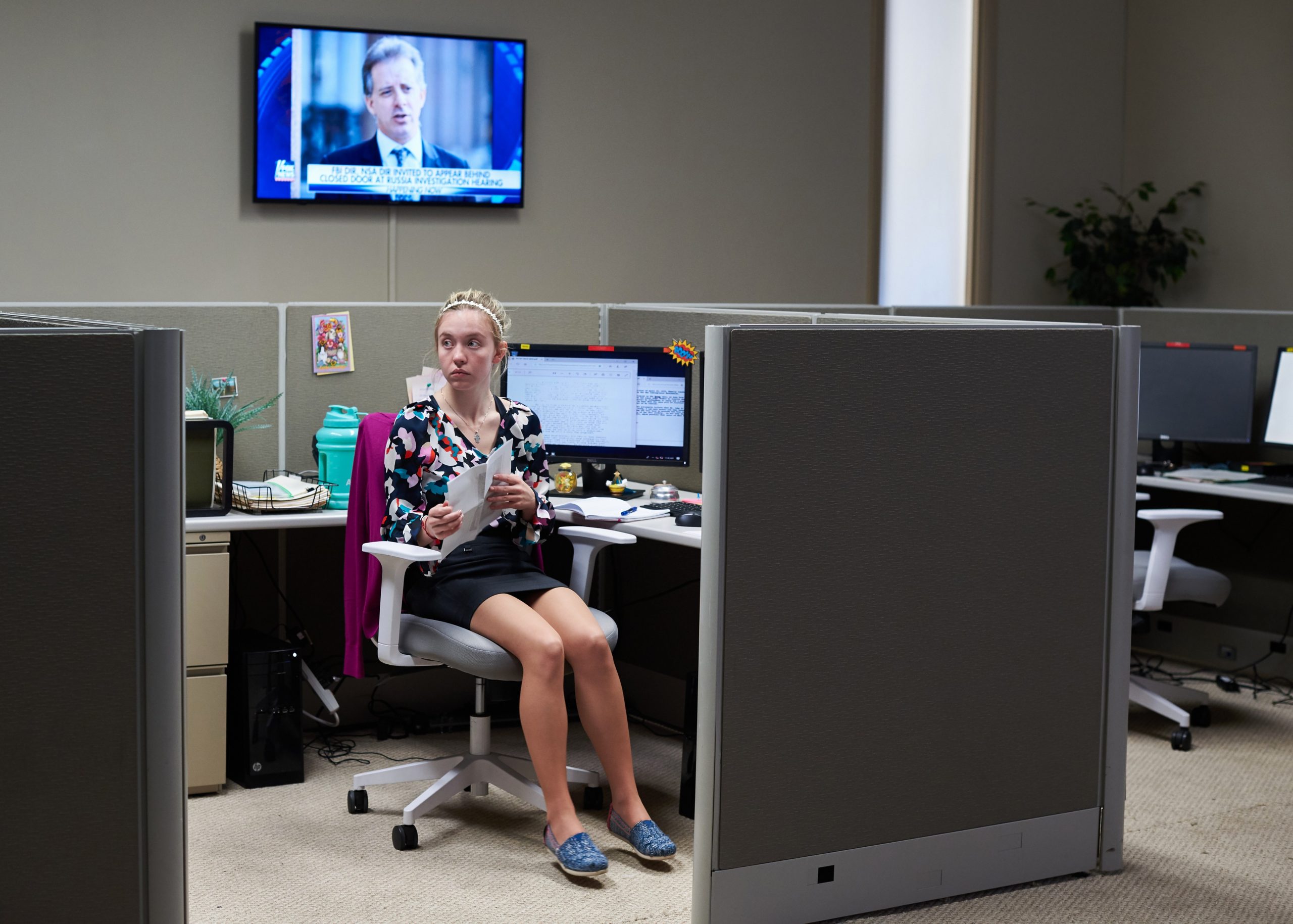
Credit: Vertigo Releasing
What would you like people to kind of take away from this?
To understand who Reality Winner is and what she did. Although she’s got so many extraordinary elements, she was also and still is a very normal, very smart, idealistic, young American who took pretty big action when she felt something was being done wrong.
To understand a young American in the recent historical cycle, I think is really valuable and what she happened to touch upon. What does it mean to have whistleblowers or not to have whistleblowers in a democracy? How is our culture and government supporting or not supporting that? Those are really big ideas, but I think they’re ones that feel really interesting to consider while also just understanding who Reality herself was on a very human level.
Reality – in UK & Irish cinemas Now

